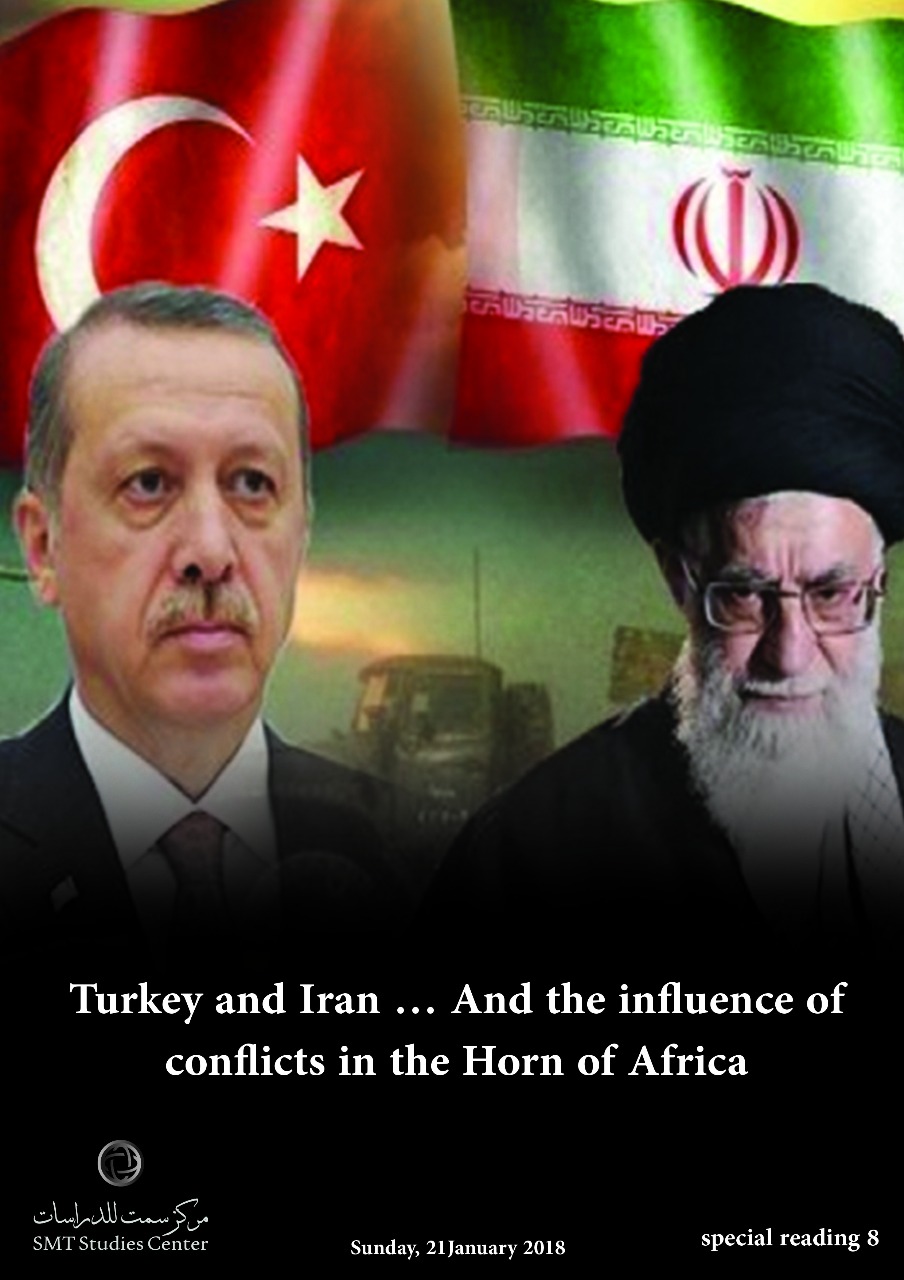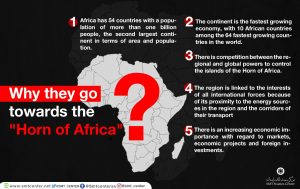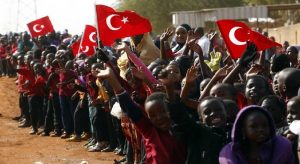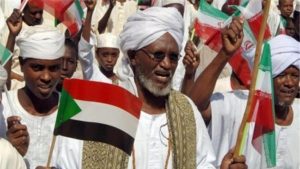Subscripe to be the first to know about our updates!

Turkey and Iran … And the influence of conflicts in the Horn of Africa
The Horn of Africa, has become a major arena for regional competition among regional powers in the region. It is also fertile ground for spreading ideas and ideologies to several internal factors that make it easy to spread among Africans.
In light of the theory of modern colonialism and international mobilization movements towards the East African region, especially the Horn of Africa, to exploit the natural resources and enhance the influence and control of the region because of its great geopolitical importance as it overlooks the Red Sea and the Bab el Mandab Strait, which is one of the most important waterways in the world Which controls the movement of world trade, as well as an important passage for any military movements coming from Europe or the United States of America in the Gulf region, which we seek to clarify the nature and motives of the Iranian-Turkish competition in the East Africa and the Horn of Africa, and the implications for stability in the region.
Why they go towards the “Horn of Africa”
At the beginning we find that one of the most important motivations towards the continent of Africa, it is gaining strategic importance can be summarized in the following points:
- Africa has 54 countries with a population of more than one billion people, the second largest continent in terms of area and population, in addition to being rich in resources and wealth.
- The continent is the youngest in terms of population age. Seventy percent of the population is under the age of 25, while the average age in Africa is 18, and this is directly related to the labor force and markets.
- The continent is the fastest growing economy, with 10 African countries among the 64 fastest growing countries in the world. East Africa is second only to West Africa in terms of rapid economic growth, and growth is expected to increase this year to 6.2% from 6% last year[1]. In terms of foreign investment, Africa attracted $ 55 billion from $ 1.26 trillion in foreign direct investment in general [2].

While East Africa includes the countries of the Horn of Africa: Djibouti, Ethiopia, Somalia, Eritrea, Sudan, Kenya and Tanzania. This region of East Africa has a global strategic position that attracts both Iran and Turkey because:
- Overlooking waterways of commercial and military importance such as the Gulf of Aden and the Bab al-Mandab Strait, and controlling access to the Red Sea.
- The region is linked to the interests of all international forces because of its proximity to the energy sources in the region and the corridors of their transport.
- There is competition between the regional and global powers to control the islands of the Horn of Africa.
- The Horn of Africa is a source of the Nile River and this has security and developmental implications.
- The region is of great importance in the national security approaches of all countries in the region.
- There is an increasing economic importance with regard to markets, economic projects and foreign investments.
- Natural gas fields are expected to be discovered off the coast of the region.
The motives of Iranian-Turkish conflict in the Horn of Africa
There are stated motives and others constitute the general content of the movements of both Tehran and Ankara in East Africa, especially the Horn of Africa, and can be summarized in:
- Turkish motives
- Political: Turkey is trying to play a global role and wants to establish itself as a state of “Afro-Eurasian” in line with the principle of multidimensional foreign policy, and this is consistent with the political thought of the Turkish leadership in that Turkey is a central state and not a bridge or margin. Its approach to East and North Africa is more than West and South Africa to sense Turkey’s overall chances will be better. It is also trying to take advantage of Ottoman historical heritage and link it with current data. The Ottomans were present in North and East Africa along the Red Sea coast and parts of the Gulf Aden, where Ottoman rule lasted for 397 years in Sudan and 350 years in Somalia, Djibouti, Eritrea, Kenya and parts of Ethiopia,
Also, Turkey does not want to leave the field to international and regional competitors, especially since competing countries such as Iran and Israel are present in East Africa, and Turkey wants to benefit from its influence in Africa in other regions and regions.

- Economically: The success of the economy is one of Turkey’s most important motivations, which has presented a success story over the past years. Turkey’s national income reached $ 820 billion in 2014, and the Turks are seeking to reach 2 trillion in 2023 and want to double their successes in Africa, which is full of opportunities. Investment, markets and resources. In light of Turkey’s offer of “temptations of cooperation”, such as cooperation with African banks, and work within the theory of “Win-Win”, which is not done by some other countries.
- Security: It is imperative for Turkey to have a balance in the levels of security and intelligence progress with its political and economic progress, especially that there are many countries such as Iran, Israel and France have great security relations in the African continent, and although the work of security is surrounded by great secrecy, but there is a sense of weakness The Turkish security role in Africa; recent evidence of this is the bombings in the vicinity of the Turkish Mission in Somalia.
Ankara has trained Ugandan troops to combat terrorism. In April 2015, it signed an agreement with Kenya to develop and modernize Kenyan security, as well as with Tanzania in 2013, encouraging the development of security in the Horn of Africa. This is some Turkish writers to say: Training in the security field is one of the most important Turkish exports to Africa, and Turkey is trying to benefit from its status and its military security experience through its presence in NATO.
It is noteworthy that Turkey’s pursuit of the activities of the Fathullah Gulen group, which the government accuses of seeking to carry out a coup against the state. Turkey has expressed concern about the activity of the group in Africa and seeks to continue the work of coordination with African governments to eliminate the influence of the group.
In its activity in Africa, Turkey is benefiting from the creation of new opportunities at all levels to provide areas for defending its interests and achieving its ambitions in an unstable regional environment. In this context, some sources point out that there are military agreements between Turkey and several African countries[3].
With a more profound view of the Horn of Africa, we can say that Turkey attaches great importance to humanity and development, and has contributed to its reconstruction, but also benefits from this in security and economic dimensions. Its relations with Somalia have been key to strengthening relations with Ethiopia on the one hand, and on the other to strengthening its presence in exchange for Iranian influence off the Somali coast.

With regard to Ethiopia, the Turkish foreign policy, which depends on the influence in the internal and external regions of the neighboring countries and the competing countries, is likely to take in one dimension a factor of political pressure through the support of the Ethiopian Renaissance Dam, which would support the rise of Ethiopia in light of the decline of the Egyptian role, It can be read from another angle that Turkey and Ethiopia are both countries of origin.
As for Eritrea, which has a coastline of 1,000 km along the Red Sea and nearly 140 islands, which Iran and Israel are seeking to make the most of it, Turkey is also trying to establish good relations with it despite Eritrean-Ethiopian differences that stand in the way of playing more effective Turkish roles, The Turks are also trying to strengthen their relations with Kenya as an important gateway to East Africa.
- Iranian motives
- Opening up to new regional fronts Iran has shown great interest in the East African region, especially the Horn of Africa, in the recent period; in order to further open regional circles to gain more regional and international support for its recent positions, especially in light of the international isolation imposed. Before signing a nuclear deal with the West in 2015[4].
- The policies of Shiite, where Iran seeks its policy in Africa in general and East Africa in particular, to spread the Shiite doctrine in preparation for the export of the Islamic revolution, through the Iranian institutions and cultural centers of Iran, which spread the Shiite doctrine, which witnessed the state of Sudan before the decision to close the centers Iranian culture on suspicion of involvement in the preaching of the Shiite religion in the country[5].
- Securing the corridors in the Red Sea. The Iranian presence in the Bab al-Mandab Strait opens the way for Iran to take control of two of the world’s most important straits, namely Bab al-Mandab and Hormuz, as well as an effective presence in the waters of the Red Sea. – specifically the Gulf – in the region
Therefore, Iran seeks to position itself in a regional position that is adapted to its capabilities according to its strategic understanding, especially in the light of the strategic changes at the international and regional levels, thus playing on the contradictions in extending its influence over several regions, especially the Horn of Africa. whether. Iran’s presence in this region allows it to communicate with its Houthi followers in Yemen, as well as to provide these groups with Iranian weapons and, in some cases, armed individuals.

- Economically, Iran aims to strengthen economic and trade relations with the East African and Horn of Africa countries. It has concluded several trade and industrial agreements and launched a number of investment projects in the region, particularly in Kenya, Eritrea, Uganda and elsewhere.
- Security , Some estimates suggest that Iran is seeking to establish a military base in the Eritrean port of Assab and confirm some Western reports of its existence. However, the Eritrean authorities denied that there were any Iranian military bases on its soil.
Moreover, the Iranian presence in the Horn of Africa has many advantages and strategic points, such as the geographic proximity of the Horn of Africa to the Middle East and the Bab al-Mandab Strait, which represents the southern entrance to the Red Sea and its proximity to the State of Yemen, which represents the back garden of the Gulf States, As well as Iran training the militants in the training camps in Eritrea by the Iranian Revolutionary Guard, according to Western reports in the area of Saoui and the northern Sahel region near the Eritrean region of Eritrea, as well as the smuggling of Iranian weapons to the Houthis through the port of B to the Yemeni stronghold of Saada, a stronghold of al-Houthi, gaining new ground for the growing influence.
Competitive returns
In the past, Turkey has won several political gains, such as Turkey’s success in winning the chairmanship of the Organization of the Islamic Conference (OIC) and the seat of the non-permanent member of the United Nations. Fifty-one of 53 African countries voted for it . Ankara has obtained considerable investment and commercial opportunities, and has held a large number of partnership agreements with Ethiopia and Djibouti, and achieved a large proportion of exports and played an important role in the reconstruction of Somalia, which carried out major projects such as the airport and the port. Turkish intelligence, in cooperation with foreign intelligence, succeeded in arresting PKK leader Abdullah Ocalan in Kenya in 1999.

On the other hand, Iran has also achieved a number of political and strategic gains by penetrating the African interior and deepening its presence in the Horn of Africa, against the backdrop of “the mutual influence of the Iranian political discourse and the integrated employment of foreign policy instruments.” The most important of these gains was to help Tehran emerge from international and regional isolation. As well as ensuring that African countries vote in their favor in many cases before international forums, or at least abstain, particularly on human rights issues and the nuclear file. In addition to increasing the volume of Iranian trade and investment in the continent, and considering some African countries as a strategic stockpile of uranium for the Iranian nuclear program.
Moreover, by reserving all West African countries, except Liberia and Togo, for the UN resolution on human rights violations during Iran’s 2009 presidential election, most African countries have issued statements confirming their support for Iran’s right to possess nuclear technology for peaceful purposes.
Presence Challenges:
Although both Iran and Turkey have sought to reap greater gains in Africa, this ambition faces some obstacles or challenges:
First: Turkey, the first challenge facing Ankara’s ambitions was to compete with other outside powers in all areas, has interpreted a number of Turkish writers the recent bombing near the Turkish Mission in Somalia as a message from foreign parties do not want the presence of Turkey there, and economic, all The parties are trying to pull the rug out from under the feet of the rest of the competitors. In this context, Ankara was angered last year when some indicators of investment confidence in Africa announced Ankara was ranked 23rd, and the Turks considered it a form of inflammatory propaganda[6].
East Africa also suffers from administrative and security problems, such as the growing activities of terrorist movements such as Boko Haram or al-Shabab. This poses a threat to Turkey’s interests, and problems among East African countries may jeopardize Turkey’s interests. Turkey is likely to continue to push for more. Of stability and balance in this region, in light of the influence of the Gulen group in some African countries could have a role in influencing the relations between Ankara and these countries.

Secondly: Iran, has faced the Iranian role in Africa, despite its successes, many challenges during the past years, most notably the failure of Tehran to meet many of its economic obligations towards some African countries. This situation was evident in the Sudanese situation. Saudi Arabia became the largest investor in Sudan, and relations between Tehran and Khartoum deteriorated,
The international pressure to limit Iranian influence in Africa has also posed a new challenge in the face of the Iranian incursion, as revealed by the closing of Iranian cultural centers in Sudan, the participation of some African countries in Operation Hazem Al Hazm against Yemen, and the support of other countries such as Mauritania and Senegal , As well as the severing of Sudan and the Comoros relations with Iran against the background of the burning crisis of the Saudi embassy in Tehran.
Sunni fears of spreading Shiism played an important role in standing up to the Iranian incursion, which became clear in the case of the Kingdom of Morocco, which has strained relations with Tehran after accusations of the latter trying to spread Shiism in the kingdom. As well as strained relations with Nigeria over accusations that Tehran supports the fundamentalist Zaqazi movement and other charges of supporting separatist movements such as Kasamance in Senegal. This has led Sunni countries to enter into a heavyweight in Africa to counter Iranian influence there, at the head of these countries, Saudi Arabia and some Gulf countries and Egypt through the missions of Al-Azhar.
In addition to the above, the most important of what is directed by Iran and Turkey is to complete their competitive role in the Horn of Africa; what is related to the increasing talk about African integration, which calls for the establishment of African-African relations, especially in the economic field and the emergence of powers within the continent such as Nigeria and South Africa in this field. Which may reduce the chances of both Ankara and Tehran on Africa.
Political studies unit *
Resources
[1] ) Aktay,Yasin, Afrika aç?l?m?nda yola devam, Yeni ?afak, 24 Ocak 2015, (Girme Tarihi 3 Mart 2015): http://www.yenisafak.com.tr/yazarlar/yasinaktay/afrika-aciliminda-yola-devam-2007403
[2] ) عباس، حسين، إفريقيا تجذب 55 مليار دولار من قيمة الاستثمار الأجنبي في 2014، رأي اليوم، 30 يناير/كانون الثاني 2015.
http://www.raialyoum.com/?p=211849
[3] ) خولي، معمر، السياسة الخارجية التركية تجاه إفريقيا، مركز الروابط للبحوث، فبراير/شباط 2015.
http://rawabetcenter.com/archives/4228
[4] ) أحمد عسكر، السعودية وإيران وتركيا: صراع النفوذ فى شرق أفريقيا، إضاءات، 4 مايو 2017،
https://www.ida2at.com/saudi-arabia-iran-and-turkey-influence-in-east-africa/
[5] )International Religious Freedom Report: (2013) https://www.state.gov/documents/organization/222317.pdf/ Fite, B. and Schulte, C. (2013). U.S. and Iranian Strategic Competition: The Impact of Latin America, Africa, and the Peripheral States. center for strategic & International studies. Retrieved on 08/04/2016. https://csis.org/files/publication/120404_Iran_Chapter_XIII-Peripheral_States-Revised.pdf
[6] )Foreign Direct Investment (FDI) Confidence Index®, Ideas and Insights, 2014, ( Access date 3 March 2015): http://www.atkearney.com/research-studies/foreign-direct-investment-confidence-index#